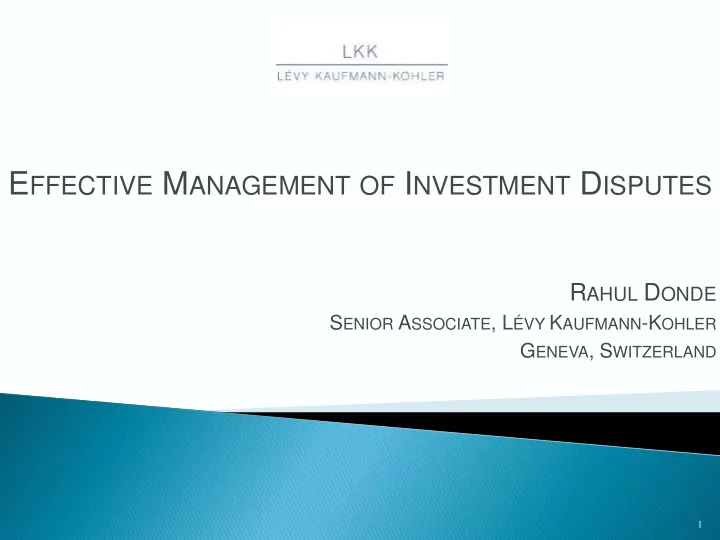

E FFECTIVE M ANAGEMENT OF I NVESTMENT D ISPUTES R AHUL D ONDE S ENIOR A SSOCIATE , L ÉVY K AUFMANN -K OHLER G ENEVA , S WITZERLAND 1
I NTRODUCTION I. I NTRODUCTION TO ISDS II. R EASONS FOR E FFECTIVE M ANAGEMENT OF ISDS III. IV. M ANAGEMENT T ECHNIQUES C ONCLUSION V. 2
I NTRODUCTION 3
2950 Bilateral Investment Treaties (“BITs”), 2360 in force 372 Treaties with investment provisions, 307 in force 2573 IIAs “mapped” for content 4
Investment Arbitration ◦ Investors enforce treaty rights directly against host States Different Procedural Rules ◦ ICSID Arbitration rules • Most popular, but limited to signatories ◦ UNCITRAL Rules • 2 nd most popular, only option available for some States 5
817 known IIA-based investor state arbitrations, 289 pending 528 arbitrations concluded, 36.6% decided in favour of States In cases decided in favour of the investor: ◦ Average amount claimed: $1.4 billion ◦ Average amount awarded: $545 million 6
7
ISDS IN A SIA 8
Over 20% disputes involve Asia ◦ 180 with Asian Respondents ◦ 112 with Asian Claimants Sectors: oil, gas, and now electricity and other energy sources Asian states have won 55% of the time More disputes predicted 9
AAPL v. Sri Lanka ◦ First IIA ISDS case: Asian (HK) investor v. Asian state Walter Bau v. Thailand ◦ First ISDS case against Thailand, damages of €30 million White Industries v. India ◦ Effective means standard; watershed in India IIA framework Al Warraq v. Indonesia ◦ OIC Agreement; first successful counterclaim under IIA 10
I MPORTANCE OF E FFECTIVE M ANAGEMENT 11
Nature of ISDS ◦ Governed by public international law ◦ Implicate important public policies ◦ Disputes are public and attract scrutiny ◦ Substantial amounts in dispute Limitations on states ◦ Restricted scope of arguments advanced ◦ External counsel to understand state’s policies and objectives ◦ Obligations to be fulfilled; politicization to be avoided 12
Limitations on states (contd.) ◦ Limited time to respond to claims; ◦ Several departments involved; document tracing difficult Costs of ISDS ◦ Major part of total arbitration costs ◦ Increasing over time ◦ No “costs follow the event” rule in ISDS 13
14
15
M ANAGEMENT T OOLS 17
Intra-governmental lead agency External counsel External advisors Focus on relevant issues Funding Other tools 18
Reason ◦ More than one ministry/department involved at central/regional/provincial ◦ Usually no authority to obtain information, documents Timing ◦ Permanent: U.S. (Office of Legal Adviser); Canada (Trade Law Bureau) ◦ Ad hoc: India Process ◦ Manage investment disputes when they arise ◦ Ensure intra-departmental cooperation ◦ Responsible for day-to-day supervision of the dispute ◦ Specific contact person 19
Reasons ◦ Investment arbitration specialized field ◦ Knowledge of processes may make all the difference e.g. appointment Timing ◦ Soon after claim has been filed Process ◦ Direct appointment: Lebanon ◦ Bid: China, Lithuania ◦ Limited bid: Costa Rica ◦ Invoke exceptions to tender rules when needed: Czech Republic 21
Reasons ◦ Urgency ◦ Tender process tedious Timing ◦ Soon after issue arises Process ◦ External advisors, need not be law firms ◦ Review and critique strategy, submissions, conduct mock hearings ◦ Chemtura v. Canada (NAFTA) 22
Reasons ◦ Ensure that state objectives are not compromised Timing ◦ Before/During arbitration Process ◦ Tribunal fees: ICSID rates in non-ICSID disputes; fee caps ◦ Detailed Procedural Calendar (e.g. longer duration for states) ◦ Use flexibility in institutional rules (e.g. SIAC expedited procedures) ◦ Use of suitable technology ( Mesa v. Canada) ◦ Dual-language proceedings 23
Reasons ◦ Resources available to quickly address procedural complexities ◦ Relevant for recurring respondent states Timing ◦ Before/During arbitration Process ◦ Permanent fund: U.S. ◦ Hiring external counsel, experts, interviews of representatives 24
Reasons ◦ Major part of total arbitration costs Timing ◦ At the end of arbitration Process ◦ Detailed costs statement, indicating costs for each phase/application 26
Build domestic capacity: Argentina, Spain Approach institutions (ICSID, PCA etc.) 27
Costs and complexity of ISDS are increasing Numerous tools to manage ISDS Tools should be deployed at the onset of a claim 28
THANK YOU! 29
30
Recommend
More recommend